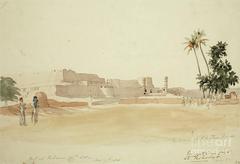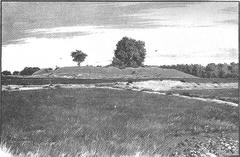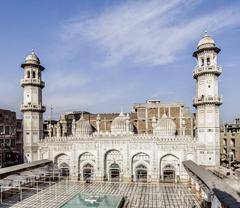Qissa Khwani Bazaar: Visiting Hours, Tickets, and Historical Significance in Peshawar
Date: 04/07/2025
Introduction
Qissa Khwani Bazaar, translated as the “Market of Storytellers,” is a vibrant historical marketplace located in the heart of Peshawar. This legendary bazaar stands as a living testament to the city’s centuries-old traditions of trade, social exchange, and storytelling. Its roots stretch back to ancient times when Peshawar was a vital hub on the Silk Road, welcoming caravans from Central Asia, the Middle East, and the Indian subcontinent. Over the centuries, Qissa Khwani evolved into much more than a commercial center—it became a cultural icon, renowned for its unique atmosphere, architectural charm, and pivotal role in the history of South Asia (Chitral Times, Medium).
Today, Qissa Khwani Bazaar remains a bustling center of commerce and culture, attracting visitors eager to experience its rich history, distinctive architecture, and enduring traditions. This guide provides detailed visitor information, including opening hours, accessibility tips, and nearby attractions, while also exploring the bazaar’s architectural splendor, cultural importance, and economic relevance in contemporary Peshawar (TravelSetu, Apricot Tours).
Historical Background
Origins and Early Development
Qissa Khwani Bazaar is among the oldest marketplaces in South Asia, with origins that trace back to ancient trade routes. Archaeological findings at nearby Gor Khatri suggest continuous human habitation in Peshawar since at least 539 BCE (Chitral Times). Its strategic location on the Silk Road made it a crucial meeting point for traders from Kabul, Delhi, Tashkent, and beyond, who would rest, exchange goods, and share stories—giving rise to the bazaar’s evocative name (TravelSetu).
Trade, Storytelling, and Cultural Exchange
During the Mughal era, Qissa Khwani flourished as a melting pot where diverse languages and cultures mingled. Merchants and travelers gathered in traditional tea houses (kehwa khanas) to narrate epic tales, preserving an oral tradition that profoundly influenced regional poetry, music, and even cinema (The Legacy Digest). The bazaar became a symbol of Peshawar’s cosmopolitan spirit and hospitality.
Encounters with Empires and Historical Figures
Throughout history, Qissa Khwani Bazaar was traversed by great conquerors and rulers, including Alexander the Great, Babur, and Nadir Shah. In the colonial era, British administrators dubbed it the “Piccadilly of South Asia,” reflecting its status as a social and economic center (Chitral Times).
The 1930 Qissa Khwani Bazaar Massacre
A defining moment in the bazaar’s history occurred on April 23, 1930, when British troops opened fire on unarmed demonstrators, resulting in the deaths of hundreds (Hindu Info Pedia). This massacre galvanized anti-colonial resistance and is commemorated as a symbol of sacrifice and resilience.
Architectural and Artistic Heritage
Qissa Khwani Bazaar’s physical landscape is characterized by a blend of Mughal and Indo-Islamic architectural styles. Narrow alleys are lined with intricately carved wooden balconies, jharokas, and historic havelis, many of which date back to the Mughal and British periods (TravelSetu). The bazaar’s spatial organization reflects centuries of trade and migration, with clusters of shops specializing in everything from textiles to brassware (Around the World 4U).
- Woodwork and Carving: Exquisite floral and geometric patterns adorn doors, balconies, and facades, showcasing the region’s artisanal craftsmanship (Discover Pak).
- Calligraphy and Tilework: Religious structures and inns feature beautiful inscriptions and glazed tiles, echoing the bazaar’s storytelling legacy (World City History).
- Brass and Metal Accents: Shops display intricately engraved copperware, adding to the bazaar’s vibrant aesthetic (Rehlat).
- Memorials: The Qissa Khwani Massacre Memorial, a white marble arch, stands as a poignant reminder of the 1930 tragedy (Rehlat).
- Bollywood Connections: Ancestral homes of film legends like Dilip Kumar and Shah Rukh Khan are nearby, drawing visitors interested in cinematic history (IHA News).
Preservation efforts are ongoing, as urban development and past unrest have threatened the bazaar’s heritage. Local authorities and community groups are actively working to restore key buildings and revive traditional crafts (Geo News).
Visitor Information
Visiting Hours and Entry
- Hours: Qissa Khwani Bazaar is open daily from approximately 9:00 AM to 8:00 PM. Some shops, teahouses, and food stalls may stay open later, especially on weekends.
- Entry Fee: There is no entrance fee. Visitors are free to explore the bazaar and its surroundings.
How to Get There
Located centrally in Peshawar, the bazaar is easily accessible by rickshaw, taxi, or public transport. It’s situated near the Gor Khatri archaeological site and the Grand Trunk Road, connecting it conveniently to other city landmarks.
Accessibility
While the bazaar’s alleys are narrow and sometimes uneven, recent improvements have enhanced accessibility. Visitors with mobility challenges should plan accordingly and wear comfortable footwear.
Best Time to Visit
The most comfortable months to visit are October through March, with mornings and late afternoons offering cooler temperatures and fewer crowds. Fridays and weekends tend to be busiest.
Guided Tours and Special Events
Local tour operators offer heritage walks and storytelling tours that provide deeper insight into the bazaar’s history and culture (Apricot Tours). Cultural festivals and storytelling events are occasionally held—check with tourism offices or local listings for details.
What to Experience
Shopping and Local Crafts
- Textiles: Shawls, embroidered kurtas, and vibrant fabrics.
- Handicrafts: Brassware, pottery, woodwork, and antiques (WildTrips).
- Spices & Dry Fruits: Saffron, cardamom, dried apricots, and nuts.
- Jewelry: Traditional silver and gold pieces.
Bargaining is customary, and prices are generally affordable.
Culinary Delights
Sample signature Peshawari dishes at street stalls and teahouses:
- Peshawari Karahi: Spiced meat with naan.
- Kabuli Pulao: Fragrant rice with lamb and dried fruits.
- Chapli Kebab: Spiced minced meat patties.
- Qehwa (Green Tea): Served in historic tea houses, the drink is a symbol of the bazaar’s hospitality (TravelSetu).
Atmosphere and Layout
Qissa Khwani is a sensory tapestry of sights, sounds, and aromas: narrow lanes reveal intricately carved balconies, colorful market stalls, and the lively interactions of traders and visitors (Apricot Tours). Warm greetings and offers of tea are common, reflecting the region’s famed hospitality.
Architectural Highlights
- Intricate Woodwork: Balconies and facades with detailed carvings.
- Historic Mosques: Including the nearby Mahabat Khan Mosque, a Mughal masterpiece.
- Gor Khatri Complex: An archaeological site worth visiting for history enthusiasts (WildTrips).
- Chowk Yadgar: A historic square and memorial.
Practical Travel Tips
- Dress Code: Modest attire (long sleeves, loose clothing, headscarves) is recommended, especially for women (HowSafe.net).
- Photography: Always seek permission before photographing people or private property.
- Safety: Peshawar is generally safe during the day, but stay aware of local guidance, travel advisories, and avoid less crowded areas after dark (ApnaTicket Blog).
- Language: Pashto and Urdu are widely spoken. English may be limited, so learning basic greetings in the local languages can enhance your experience.
- Transport: Use public transport or negotiate rickshaw fares in advance. Parking is limited, so walking is often easiest.
Nearby Historical Sites
Enhance your visit by exploring:
- Bala Hisar Fort: A Mughal-era fortress with panoramic city views (World City History).
- Peshawar Museum: Home to Gandharan art and regional artifacts.
- Sethi House Museum: An 18th-century mansion with exquisite woodwork (Around the World 4U).
Frequently Asked Questions (FAQs)
Q: What are the visiting hours for Qissa Khwani Bazaar?
A: Shops are generally open from 9:00 AM to 8:00 PM, with some food stalls open later.
Q: Is there an entrance fee?
A: Entry to the bazaar is free.
Q: Are guided tours available?
A: Yes, guided walks and heritage tours can be arranged via local operators (Apricot Tours).
Q: What is the recommended dress code?
A: Modest clothing is advised for all visitors, respecting local customs.
Q: How do I get to Qissa Khwani Bazaar?
A: The bazaar is centrally located and accessible by rickshaw, taxi, or public transport.
Visual Recommendations
- Photography: Capture vibrant market scenes, traditional woodwork, and bustling tea houses—sunrise and sunset offer the best lighting.
- Maps: Use digital maps or local tourism websites to plan your route and explore nearby historical sites.
Summary and Visitor Recommendations
Qissa Khwani Bazaar is a remarkable fusion of history, culture, architecture, and commerce, embodying the very soul of Peshawar. From its ancient role as a Silk Road crossroads to its legacy as the “Market of Storytellers,” it offers visitors a living chronicle of human connection, artistry, and tradition (Around the World 4U, IHA News). Despite challenges from urban development and security concerns, ongoing preservation efforts continue to protect its unique character.
Plan your visit during the cooler months, consider guided tours for deeper insights, and don’t miss nearby heritage sites such as Gor Khatri, Bala Hisar Fort, and Mahabat Khan Mosque (Geo News, WildTrips). Embrace the bazaar’s warmth, flavors, and stories, and contribute to keeping Peshawar’s storytelling tradition alive.
For updated travel information, guided tour bookings, and further tips, consider downloading the Audiala app and following local tourism channels.
References and Further Reading
- Chitral Times
- TravelSetu
- The Legacy Digest
- Hindu Info Pedia
- Medium
- Apricot Tours
- Around the World 4U
- Rehlat
- IHA News
- World City History
- Geo News
- WildTrips
- HowSafe.net
- ApnaTicket Blog
- Discover Pak
- Graana
- Visit Silk Road




